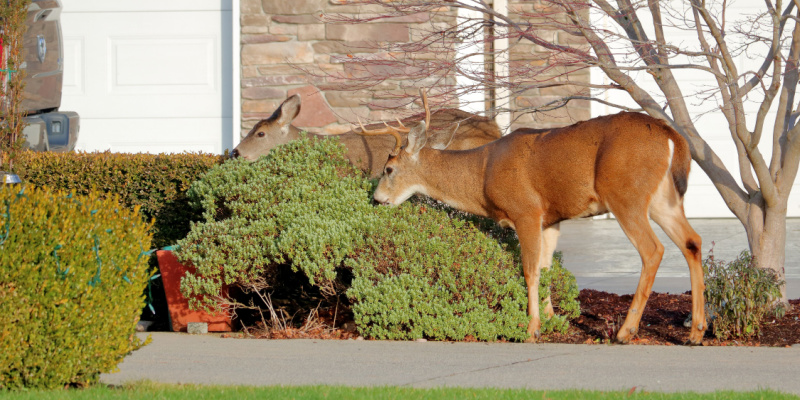In the verdant stretches of New Jersey, it's not uncommon for homeowners to find themselves sharing their outdoor spaces with the local deer population. While these graceful creatures can be a sight to behold, they can also pose challenges, especially when they take a liking to your carefully curated garden. If you're facing the predicament of deer treating your plants as their personal buffet, here's a guide on what you can do keep the deer away.
Understanding the Deer Palate
Before we delve into prevention, it's essential to understand why deer might be attracted to your garden:
- Varied Diet: While deer have their favorite plants, they are not particularly picky eaters. Depending on the season and availability, they might nibble on various plants, flowers, and shrubs.
- Nutritional Needs: Deer seek out plants that fulfill their nutritional requirements. This can vary based on the time of year, with them seeking out different plants in the spring than in winter.
Strategies to Protect Your Garden
- Fencing: Installing a fence is the most direct way to keep deer out. Since deer are excellent jumpers, the fence should be at least eight feet tall. If a tall fence isn't feasible, consider installing a double fence. Two parallel fences, even if shorter, can deter them, as they're hesitant to jump when they can't see a clear landing area.
- Deer-Resistant Plants: Incorporate plants in your garden that deer typically avoid. Examples include foxgloves, daffodils, and certain herbs like mint and chives. While no plant is entirely deer-proof, some are less appealing to their palate.
- Repellents: There are numerous commercial deer repellents available that can be applied to plants. These products work by making plants taste or smell unappealing to deer. Remember to reapply after rainfall or as directed by the manufacturer.
- Natural Deterrents: Some homeowners have found success using natural deterrents like soap bars, hair clippings, or even predator urine. While these methods can be hit or miss, they're worth considering, especially if you're looking for a non-chemical solution.
- Motion-Activated Devices: Devices that activate upon detecting motion, such as sprinklers or lights, can deter deer. The sudden movement or illumination can make deer hesitant to approach.
- Professional Help: The deer issue is so problematic in this area that there are pest control companies that offer deer control. This process is about repelling the deer from your garden so they do not come back in the future – and not about doing any harm to the deer.
Additional Tips and Considerations
- Rotate Deterrents: Deer are adaptive creatures. If they realize a deterrent isn't a real threat, they might become desensitized to it. Rotate between different deterrents to keep them guessing.
- Protect Young Plants: New plantings and young shoots are especially vulnerable. Consider using protective netting or cages around new plants until they're established.
- Community Collaboration: Collaborate with neighbors and the local community. Collective efforts, like neighborhood-wide repellent use or shared fencing, can be more effective than individual actions.
- Stay Informed: Deer behavior can change based on various factors, including local food availability, weather patterns, and population dynamics. Stay informed about local deer activities and adapt your prevention strategies accordingly.
Deer, with their serene presence, are a cherished part of the New Jersey landscape. However, when they venture into our gardens, the relationship can become a tad strained. By understanding their behavior and employing a mix of preventive measures, homeowners can find a middle ground. After all, the goal isn't to alienate these beautiful creatures but to coexist with them in a way that respects both their needs and ours. With a bit of effort, your garden can thrive without becoming a free-for-all for the local deer population. If you are in a place where you need professional help keeping the deer out of your garden, call the local experts at PermaKill Exterminating.


